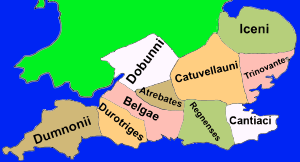Cornovii (Cornwall) facts for kids
The Cornovii were a group of people who might have been part of a larger Celtic tribe called the Dumnonii. The Dumnonii lived in the southwest part of Great Britain during the Iron Age, when the Romans were there, and after the Romans left. The Cornovii are thought to have lived in the area we now call Cornwall. In fact, the name "Cornwall" might have come from the name of this group!
We don't have many old records that directly mention the Cornovii. They aren't listed in a famous map from the 2nd century called Ptolemy's Geography, which mentions many other tribes. We mostly know about them from a very old list of places called the Ravenna Cosmography, written around 700 CE. This list mentions a place called purocoronavis. Experts believe this was a mistake and should have been durocornavis. This means "the fortress of the Cornovii."
Contents
What Does the Name Cornovii Mean?
The "Horn" Connection
There were two other tribes named Cornovii in Britain. One lived in the Midlands and another in the far north. This is why experts think the group in Cornwall also had this name. The name *cornu- comes from an old Brittonic word meaning "horn."
Many people think this "horn" refers to the shape of the land. Cornwall is at the end of a long, narrow peninsula, which looks a bit like a horn. So, the name might mean "the people of the horn" because of where they lived.
Other Ideas for the Name
Some historians have different ideas about the name. One idea is that "Cornovii" refers to people who lived in promontory forts. These are forts built on pieces of land that stick out into the sea.
Another idea is that the name might be linked to a "horned god" that these tribes worshipped. This god might be similar to Cernunnos, a horned god from ancient Gaul.
Did They Move to Cornwall?
A historian named John Morris once suggested that the Cornovii from the Midlands moved to Cornwall around 460 AD. He thought they might have been sent to rule the land and protect it from invaders.
However, most modern experts don't agree with this idea. They believe the Cornovii in Cornwall were a local group of people. They were different from the tribes with the same name in the Midlands and the far north.
How Cornwall Got Its Name
The extreme western part of the Dumnonii's land became known by different names in Celtic languages. In Welsh, it was "Cernyw." In Cornish, it was "Kernow." In Breton, it was "Kernev (Veur)."
The English name Cornwall comes from these old names. The Old English word wealas meant "Brittonic-speakers." When this was added to the Brittonic place-name, it became "Cornwall."
History of the Cornovii
Since we only know about the western Cornovii from one old mention, we don't know much for sure about their history. They were part of the Dumnonii tribe. The Dumnonii's lands, called Dumnonia, covered Cornwall, Devon, and parts of Somerset and Dorset.
After the Romans left Britain, the Cornovii area might have become a smaller kingdom within Dumnonia. This lasted until the early 9th century. In 838, the Cornish people, who were allied with Vikings, were defeated by the West Saxons at the Battle of Hingston Down. This battle led to Cornwall losing its independence.
Where Did They Live?
The Dumnonii didn't have one main tribal center. Ptolemy's Geography lists four Dumnonian towns: Voliba, Tamara, Uxella, and Isca Dumnoniorum (which is now Exeter). However, Ptolemy probably only listed Roman towns, not native settlements.
Some people think Voliba might have been in Cornwall. Tamara is thought to be on the River Tamar, which is now the border between Cornwall and Devon. In 2008, a Roman fort was found near Calstock. This might be the location of Tamara, as it's close to the River Tamar.
The Ravenna Cosmography also lists many names of places. Some of these are thought to be west of Exeter. Purocoronavis, which is where the name Cornovii comes from, is one of them. Other names are very hard to figure out, like Giano, Pilais, and Vernalis. These might also refer to places where the Cornovii lived.
What Language Did They Speak?
The people who lived in this area before the Romans spoke a Celtic language. Over time, this language developed into the Brythonic language we now call Cornish.
See also
- List of ancient Celtic peoples and tribes
 | James Van Der Zee |
 | Alma Thomas |
 | Ellis Wilson |
 | Margaret Taylor-Burroughs |



